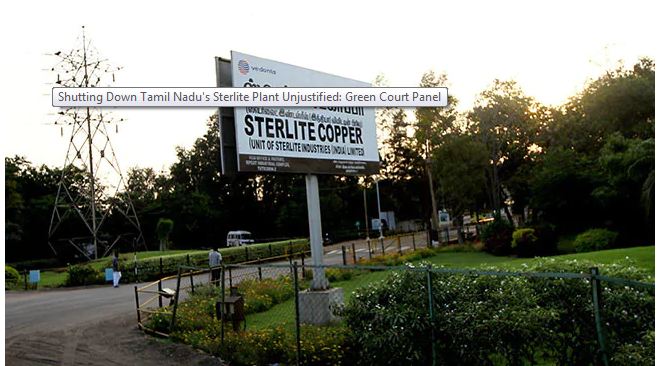A National Green Tribunal (NGT) appointed committee that looked into the closure of Tuticorin based Sterlite Copper Plant has termed the orders to close down the plant as against the principles of natural justice.
Tamil Nadu government succumbed to the pressure of left-leaning protest groups and ordered permanent shutdown of plant under Water (Prevention and Control of Pollution) Act, 1974. This is a huge setback for these groups and Christian missionaries which were hell bent on the closure of plant for their personal gains.
Following the closure in May, NGT formed a three member committee headed by Meghalaya High Court Chief Justice Tarun Agrawal in August to reconsider the shutdown. “The impugned orders cannot be sustained as it is against the principles of natural justice. No notice or opportunity of hearing was given to the appellant. The grounds mentioned in the impugned orders are not that grievous to justify permanent closure of the factory,” the committee told a bench headed by NGT Chairperson Justice Adarsh Kumar Goel.
The committee recommendations include constituting a monitoring group for sampling of solid waste and effluent/emission. The monitoring group will be constituted by Tamil Nadu Pollution Control Board (TNPCB) and comprise representatives of the District Collector, an official from TNPCB, NGOs and academicians. Tamil Nadu government could have taken these measures without ordering a complete shutdown but it decided to deal the matter with heavy handedness. The state government was well aware of the importance of Sterlite plant for the economy of state but it succumbed to the pressure exerted by Christian missionaries, left-leaning groups and NGOs which get substantial foreign funding.
It was found that even the church was involved in organizing the protest against the Sterlite plant. Swarajya Magazine had earlier reported that the churches in the region appealed to its members to support the anti-Sterlite protest. The magazine had also reported that a mob, comprising of around 5,000 people, had gathered in front of one of the churches in the region before it proceeded to wreak havoc. The article went on to claim that according to the Intelligence Bureau, there were Naxal elements among the protesters too and that the police had been tipped off about this. So, it seems that church and Naxals succeeded in hampering the economic interests of India, Tamil Nadu, and poor people of the region due to the lackluster attitude of state government. But the NGT committee report is a relief for the economy of the state and blow to ideologically affiliated groups.
Vedanta Sterlite copper plant in Tuticorin alone produced 40 percent of the country’s total copper, and hence it is significant for the entire nation. Copper imports to India rose by 221 percent in June quarter, primarily due to the closing of Tuticorin plant. Tuticorin plant produced 400,000 tonnes of Copper per annum, accounting for 40 percent of total copper production in the country. After its closure, total production in India fell by 47.1 percent in the June quarter. The rise in prices of copper due to shutdown has led businesses and people to look for the alternatives of copper. Alternatives for copper in electrical repairing (34%) and other purposes though appears viable but its uses in building & construction (8%), automobiles (11%) and consumer durable segments (8%) have to bear with losses of increased price.
The ‘economic interest’ of the country witnessed a setback due to the closure of the Tuticorin plant and this is an example of how politics over important institutions can hamper the interest of the nation. The closure of plant did not only hurt the copper industry but also thousands of medium and small sector units which were dependent on Vedanta’s plant. The ‘negative spillover effect’ of the closure of plant impacted the electrical industry, building and construction industry, automobiles industry, and consumer durables industry.
The state governments should have a more co-operative attitude towards industries. Only initiatives from central government will not be enough for the growth of economy.
